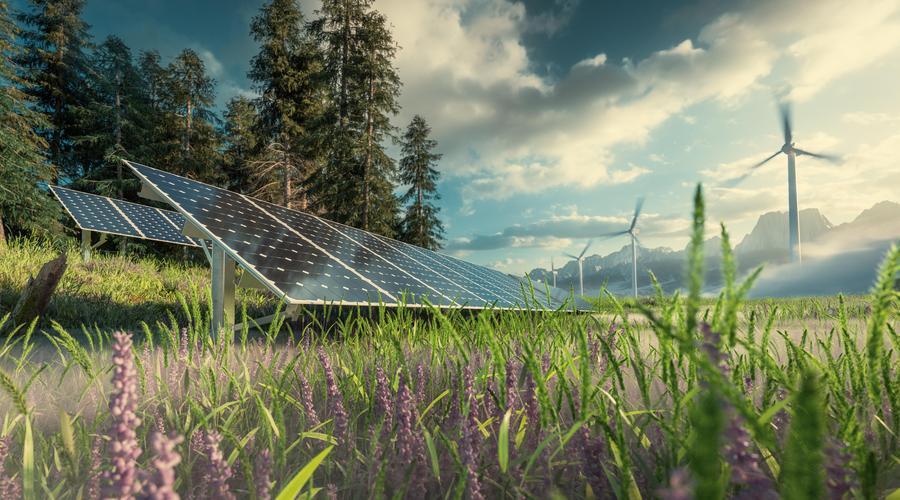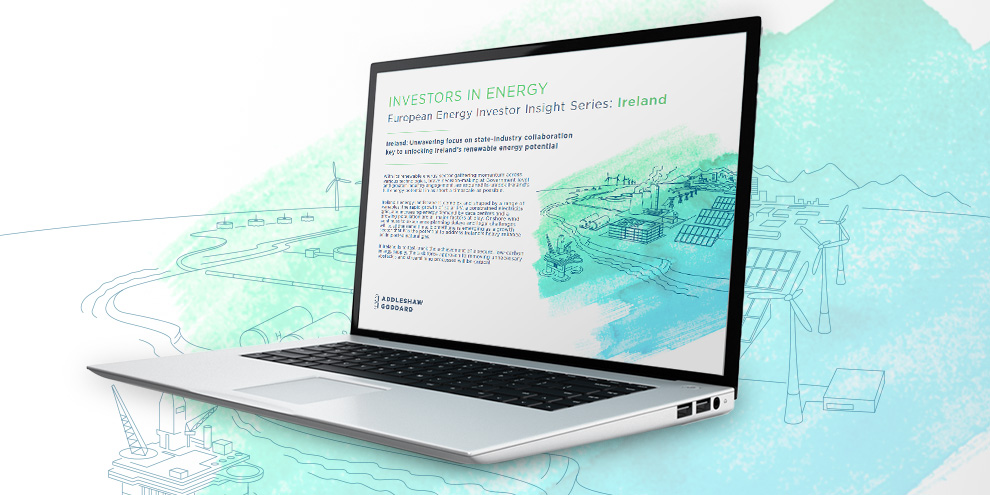
(3 min read)
Private wires are set to be permitted in Ireland following the adoption of a Private Wires Policy Statement (the “Policy Statement”) by the Irish Government this month. This is a step change in the area that will require legislative change and regulatory support to implement. In this briefing, we look at the policy changes in the Policy Statement and explore the potential opportunities and benefits that could flow from it.
What is a Private Wire?
A “private wire” is a privately owned electricity line used to supply electricity between a single generator and a single demand user. This could involve, for example, a large energy user (“LEU”), such as a data centre, consuming electricity via a direct line with a renewable energy generator, without needing to connect to the national electricity grid (the “Grid”).
Current Position on Private Wires
Ireland’s current regulatory framework provides that only ESB can own the onshore distribution and transmission networks. In addition, only ESB Networks DAC can operate the onshore distribution network and only EirGrid can operate the onshore transmission network. Owning and operating electricity infrastructure by anyone other than these entities (i.e. a private wire) is not permitted, except in limited circumstances.
Private Wires Policy Statement
Momentum for change in this area has grown in recent years, particularly as agencies such as the Commission for Regulation of Utilities (“CRU”) have actively sought to manage increasing demands on the Grid – for example, through its policy direction limiting data centre connections to the Grid in 2021. In August 2023, the Government published a consultation paper on private wires, with a summary report of the consultation published in July 2024. In the summary report, the Government observed that the role of private wires was seen by most respondents to the consultation as a possible solution to issues experienced by electricity generators and customers in Ireland.
The Policy Statement provides that private wires will be permitted in four scenarios, where the Government considers that the public benefits of allowing the development of private wires is clear. These scenarios are:
Private Line from Generator to Customer
The most significant of the permitted scenarios, this is a direct connection between a single generator and a separate single user of electricity, and / or a battery and a separate single user of electricity. This type of private wire will be permitted where it is more cost effective for the entities in question and the system as a whole, than both entities connecting to the Grid.
There are a number of criteria that will apply to this type of connection:
- The project serves public policy objectives including security of supply, the offshore wind strategy, the hydrogen strategy, and the national climate objective;
- A lower-cost, grid-based, solution is not available to the customer or customers within a reasonable period of time;
- The System Operators (“SO”) will be able to recover the full cost of the services they have contracted to provide to the electricity customer in question, including by means of revised tariffs if necessary;
- The same technical and safety standards as the Grid will apply to the private wire and it will be capable of being taken in charge by the SOs;
- The private wire must not interfere with the operation of the Grid, or with any planned expansion or reinforcement of the Grid.
Hybrid Connections
This scenario is where two different technologies share the same Grid connection (for example a solar farm and a storage facility owned by different legal entities). Legislative changes will be implemented to clarify that two separate legal entities will be permitted to share the same Grid connection.
On-Street EV Charging
This scenario could permit running electricity lines in public or shared spaces to enable electric vehicle (“EV”) charging. For example, this may allow a generator to build a public charging station to supply power for EV charging.
Expansion of Self-Supply
The current regulatory structure allows for self-supply of electricity, i.e. a customer may generate and consume electricity on the same site but is not permitted to transmit electricity to another site. The rules around self-supply will be expanded to allow such customers to supply electricity to a separate customer on an adjoining premises.
Private Wires: Opportunities and Benefits
While the specifics of how private wires will be regulated remains to be seen, there are several areas where private wires could have a significant positive impact. These include:
- Data Centres and LEUs: Data centres are currently facing challenges connecting to the Grid due to current CRU policy which came into effect in 2021. Private wires represent a new route to power for data centres that are unable to connect to the Grid, by allowing a private line connection directly with a generator. It would also likely allow a data centre to have more control on connection build timelines, resulting in a faster development timeline.
- Accelerate the Deployment of Renewable Energy: Private wires could effectively provide a new route to market for renewable electricity developers. This could significantly enhance the ability of developers to finance a project outside of the Renewable Electricity Support Scheme (RESS), which requires connection to the Grid as part of its terms and conditions. Private wires have the ability to unlock generation in locations where Grid access is scarce and therefore unable to support new generation. Creating more opportunities for renewable electricity generation would encourage greater investment and accelerate its deployment in Ireland.
- Boost the Corporate Power Purchase Agreement (“CPPA”) Market: By allowing more opportunities for generators to connect with data centres and other LEUs, the CPPA market in Ireland could benefit from an increase in commercial opportunities and offer more choice on the types of CPPAs used. Private wires also have the benefit of allowing the corporate off-taker to prove direct consumption of green power, something that cannot be claimed when consuming power from the Grid.
- Security of Supply: By taking electricity demand away from the Grid, private wires can alleviate pressure on the Grid and potentially reduce the growing reliance on expensive emergency back-up generation (typically powered by fossil fuels). Private wires also have the potential to reduce high curtailment levels on the Grid, which have increased dramatically in recent years. They could also offer ESB Networks and EirGrid some breathing space to deploy much needed investment in Grid infrastructure, which has been identified as an area of priority under the National Development Plan Review 2025.
The Policy Statement is expected to bring about significant change to the regulatory landscape for electricity infrastructure in Ireland. It has the potential to create many opportunities for generators, users and the electricity market in Ireland in the coming years.





